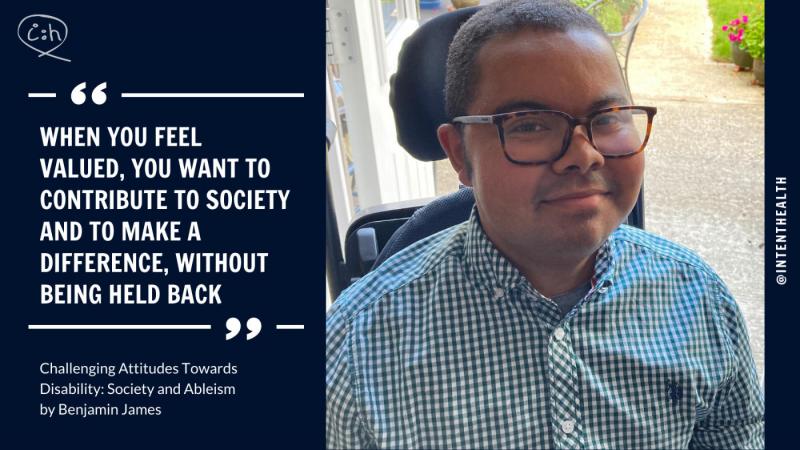
Article first appeared on Intent Health's blog.
Finding your first job can be difficult, especially when you’re side-tracked by a global pandemic and live with Duchenne Muscular Dystrophy, a rare progressive condition. Before joining Intent Health, I was lucky enough to work on short-term projects with Open Health, Duchenne UK and was a trustee for the Pathfinders Neuromuscular Alliance. These projects were mostly for the Duchenne community, and I didn’t want this to be my career focus. I wanted to work within healthcare communications.So, when I was offered a six-month internship with Intent Health, I took the opportunity. Having only worked independently or with one other person, I wanted to be part of a growing team. Even though I had nothing to compare it to, I knew Intent Health was onto a good thing with their straightforward interview process and was offered the internship based on previous projects and personal experience living with a rare condition. This felt so refreshing, like the right opportunity to grow and work in an environment where I could thrive.
Society does not always value difference. Unfortunately, this can manifest in attitudes of ableism, whether they are obvious or hidden, acknowledged, or dismissed. They can be defined as the ideas, assumptions, and stereotypes against those with disabilities, or physical barriers and organisational practices that put people with disabilities at a disadvantage. Ableism sets groups of people with disabilities as inferior to non-disabled people, leading to a world of exclusion, inequality, isolation, and negative treatment, just because you are perceived as ‘different’ or ‘other’.
I acknowledge we have come a long way to ensure those living with disabilities can be seen, heard, treated with respect, and can contribute to society in the UK. For example, those living with disabilities now have legislation for equality in the Disability Discrimination Act in Northern Ireland (1995; updated in 2005) which is now the Equality Act (2010) in the rest of the UK. The Disability Discrimination Act was lobbied for by many disability rights campaigners, activists and protesters, from groups such as the Disabled People’s Direct Action Network. Both acts give disabled people the right to be protected against direct discrimination, failure to make a reasonable adjustment, victimisation and harassment, covering areas including employment and occupation, education, and transport. It seems that disability is accepted more than ever, whether this is through legislation or increased representation in popular culture. However, it is worth questioning the authenticity of these changes. Legislation and increased representation is one thing, changing attitudes and perceptions is another. I believe there is still a long way to go before those with disabilities are treated as true equals within society, particularly in relation to the disability employment gap (the employment rate is nearly 30% less than those without a disability) and access to suitable housing.
One of the ways disabled people could challenge ableism and gain true equality can be explored through the lens of the social model of disability. The social model of disability states that people are disabled by barriers in society, not by their difficulties. These barriers can be physical or caused by stereotypes, ideas or assumptions that disabled people cannot make a valued contribution to society. Removing these barriers creates an inclusive society, working towards equality and giving people with disabilities more freedom and control.
As someone who lives with a progressive rare condition, I have experienced these barriers first-hand, and at times felt socially excluded. It feels like there’s an expectation that I can’t have the same aspirations and desires in life as others. For example, attending higher education, pursuing friendships and relationships, living independently, socialising, and generally living a ‘normal’ life. I identify as being mixed raced and have found my disability to trump any discrimination I might have faced because of my race. I know this is not true for everyone, but this has been true for me. By no means do I want to dismiss racism. Racism is abhorrent. Racism has no place in society. And ableism, like any form of discrimination, needs challenging and stamping out.
Attitudes of ableism can manifest in many ways. As someone with a disability it often means I have to ‘make the most of the situation’ or think to myself, “at least I could get into this building”, even if that means facing humiliation and embarrassment. I don’t complain as this happens daily, but it’s exhausting. Ultimately, like everyone else, I just want to live my life.
So how can you challenge these attitudes in society? There is nothing to be feared; disabled people can make a valuable contribution to society.
In the UK it is estimated that more than 1 out of 5 people live with a disability, which is nearly 14 million people. That is a significant number of people who want to be valued, to be seen, to have a voice, to be included and to contribute to society.
When you feel valued, you want to contribute to society and to make a difference, without being held back. Having a disability is not a barrier, it is society and the attitudes it peddles that that are barriers. But these can and should be overcome, allowing everyone to thrive. And if you want to know how – come talk to me about open roles at Intent Health.

